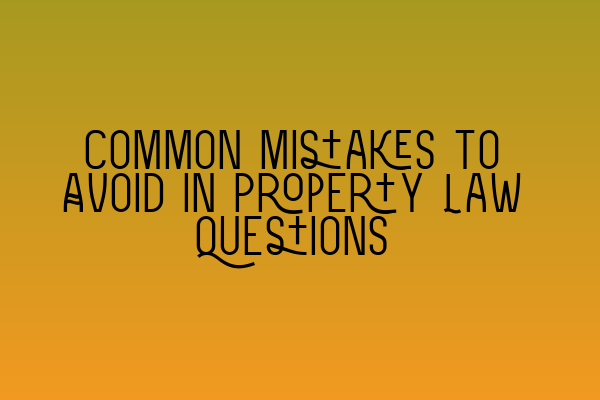Common Mistakes to Avoid in Property Law Questions
When it comes to property law, even the smallest oversight or misunderstanding can have significant consequences. Whether you are studying for the SQE 1 or SQE 2 exam or working as a solicitor, it is crucial to be aware of common mistakes that can arise in property law questions. By avoiding these pitfalls, you can ensure that you are on the right track to success.
1. Failing to understand the basics:
One of the most common mistakes is neglecting to grasp the fundamental concepts of property law. It is important to have a solid understanding of topics such as the types of property ownership, the different interests in land, and the requirements for a valid transfer of property. Without this foundation, it becomes challenging to answer complex property law questions.
2. Ignoring statutory provisions:
Property law is heavily influenced by legislation. Many aspiring solicitors tend to overlook the importance of statutory provisions and focus solely on common law principles. It is crucial to consider both statutory and common law provisions when answering property law questions. Familiarize yourself with relevant legislation, such as the Law of Property Act 1925 and the Land Registration Act 2002, to ensure you provide a comprehensive answer.
3. Overcomplicating the issue:
Sometimes, the key to answering property law questions correctly lies in simplicity. Avoid overcomplicating the issues at hand by applying unnecessary legal tests or introducing irrelevant concepts. Instead, adopt a logical and straightforward approach, clearly identifying the legal principles involved and applying them to the facts of the case.
4. Neglecting to analyze conflicting interests:
Property law often deals with conflicting rights and interests. Neglecting to analyze the interests of all parties involved can lead to an incomplete analysis and a flawed answer. Take into account the competing interests of landlords and tenants, mortgagees and mortgagors, or co-owners, and consider how their rights may interact in a given scenario.
5. Failing to spot relevant issues:
Property law questions can be complex and multi-faceted. It is crucial to carefully read and analyze the question, identifying all the relevant issues and sub-issues. Failing to spot a crucial issue can result in an incomplete or incorrect answer. Practice spotting the key legal points by taking SQE 1 practice exam questions, which will help hone your analytical skills.
6. Not citing relevant case law:
Case law is an integral part of property law. Failing to cite relevant cases or not adequately explaining their application can weaken your answer. When confronted with a property law question, consider relevant precedents and illustrate their impact on the particular issue at hand. SQE 1 practice mocks FLK1 FLK2 can assist you in familiarizing yourself with important case law.
7. Poor time management:
Under time pressure during exams or when working on cases, time management is key. Poor time management can lead to incomplete or rushed answers, potentially costing you valuable marks. Practice time management skills by taking SQE 1 preparation courses or utilizing time management techniques during your studies.
By avoiding these common mistakes, you can significantly improve your performance in property law questions. Remember to engage in extensive practice and preparation to enhance your understanding and application of property law principles. SQE 2 preparation courses can further supplement your knowledge and skills for more advanced property law scenarios.
Stay up-to-date with SRA SQE exam dates to plan your study schedule effectively and ensure you are adequately prepared for the exams.
In conclusion, property law questions can be challenging, but with the right approach and attention to detail, you can excel. Focus on understanding the basics, considering both statutory and common law provisions, and analyzing conflicting interests. Additionally, practice spotting relevant issues, citing relevant case law, managing your time effectively, and continually updating your knowledge. By following these guidelines, you will be well-equipped to navigate the intricacies of property law successfully. Good luck!
